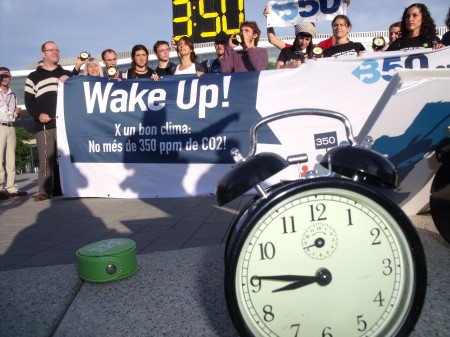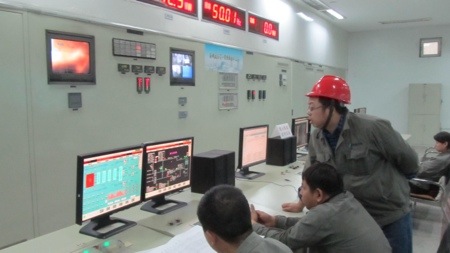
Starting in 1989, a group of wildcatters raced across a 12-county stretch of northern Michigan to drill natural gas wells, and build all the roads, pipelines, pumping stations, and processing facilities to develop the region’s Antrim shale, the first shale gas play tapped in the U.S. For most of that time, until Wyoming’s coalbed-methane reserve development really got rolling in the late-1990s, northern Michigan was the most intensively drilled region of the continent. More than $2 billion in infrastructure was installed — including over 9,000 wells — across a heavily forested region that sustained considerable environmental damage. The Antrim shale yields about 130 billion cubic feet of gas a year now, ranking number 13 nationally among shale gas plays.
Although the intensive development prompted vigorous civic opposition and new state laws to reduce damage, the resistance amounted to a mere nuisance to the drilling companies. With two exceptions — drilling was barred in a 22,000-acre protected forest reserve in 1998, and the state Legislature and Congress intervened in 2002 to outlaw wells from being drilled beneath the Great Lakes — the companies went where they wanted and did what they needed to do.
Michigan’s experience with the Antrim play is typical and consistent with what’s going on now to tap oil and gas shale reserves nationally. A boom is occurring not only because prodigious oil and gas reserves exist and new technology enables companies to bring them to the surface, it’s also because law and policy confer to energy producers rights that are superior to almost any other industry.
The most powerful advantage is mineral rights, authorized by state law, to develop oil and gas where it exists. A mineral right, essentially a property right that provides access to reserves that lie deep in the earth, is superior to a landowner’s right to manage land on the surface. In cases where surface owners do not also own their minerals, the owner of the mineral right has the authority to install wells and other infrastructure needed to develop the reserves. It’s a bitch for people who have “severed minerals.” They literally have no legal way to prevent drilling or other development on their land. And once developers secure access to oil and gas through binding leases, all they need to develop them is a state or federally issued permit. The permit provides an absolute property right to develop those reserves. Local zoning provisions are rendered moot for establishing new wells, though they can be applied to compressors and some other oil and gas installations in regions that have effective rules and the will to enforce them.
The oil and gas industry also enjoys other legal and policy privileges. Those include the smorgasbord of exemptions from federal and state air, water, hazardous waste, and siting laws that apply to other industries. In Ohio, regulators recently issued stricter regulations for managing Class II deep injection wells used to dispose wastewater from oil and gas production sites. The state took the action because of earthquakes that occurred around a year-old Class II well in Youngstown.
The energy industry’s toxic wastewater is exempt from many of the stringent disposal requirements of the Resource Conservation and Recovery Act, the federal hazardous waste law. As a result, oil and gas producers can pour their wastes down Class II wells instead of the more rigorously constructed and managed Class I disposal wells. The federal government does not require an assessment of earthquake risks for building and operating Class II wells. It does for the more expensive Class I wells, which typically receive the most hazardous wastes.
The oil and gas industry’s competitive advantage includes favorable tax credits, direct grants, and other public investment. And they include the phalanx of state and federal elected lawmakers, appointed officials, and academics — all dependent to one degree or another on the stream of energy industry investment in the public process — who are sympathetic to the industry’s production goals and terrifically positioned in the legislative and executive branches to assure that those goals are achieved. The result, as we are witnessing with the new American energy boom, is a massing of industrial might marching virtually unchallenged across the country to perpetuate the fossil fuel economy.
Now contrast that with the barriers to entry for the clean energy industry. They are high and often insurmountable. Let’s start with a little story, also from this region of northern Michigan.
Two years ago Duke Energy responded to Michigan’s renewable energy standard for electricity — requiring utilities to produce 10 percent of their power from renewable sources by 2015 — by proposing to build 112 utility-scale wind turbines in Manistee and Benzie counties. Three months ago Duke baled after a fierce push-back from residents who developed a scientifically disputable but effective critique of the project’s consequences for health, land, property values, the economy, the environment, and the quality of life. The short lifespan of the Duke windfarm here reflects more than the nation’s new 21st century DNA — do nothing anywhere — it also illustrates the mismatch in the barriers to entry that exist for clean energy producers and fossil fuel producers.
Developers of wind and solar plants have no established property right to execute their projects, like the oil industry does. Opponents of clean energy installations can turn to local zoning, state wind and solar siting requirements, local and state public health requirements, various environmental review steps, operating requirements of utilities that purchase the power, and an endless number of other measures that require public notice, public review, public comment. In contrast, the oil industry contends with virtually no public comment steps when it develops privately-owned minerals. And it faces scant public comment when developing mineral rights owned by states and the federal government.
The clean energy industry also faces constant doubt and opposition from fossil fuel-supported lawmakers about the value of federal clean energy subsidies, and the cost of state renewable energy standards. Congress has not decided whether to renew the federal production tax credit for wind, which is really hurting markets for manufactured components. In Ohio and Michigan, Republican lawmakers propose to eliminate renewable energy requirements for utilities, though the Republican governors in the two states support the standards. The uncertainty is a challenge to the clean energy industry’s prospects in the Midwest.
— Keith Schneider

You say:
“The permit provides an absolute property right to develop those reserves. Local zoning provisions are rendered moot.”
This is not true everywhere.
In PA, a recently passed law makes such zoning unattractive to localities – but not impossible. In NY there are currently two lawsuits challenging the more than 60 local bans and moratoria. At the first level of challenge the bans on drilling in each town were upheld.
The cases will now be appealed.
I presume that there are other instances.
However, in general I agree that the rules and laws are constructed behind the curtain and tend to be pretty favorable to drillers and against individual citizens.
Stanley R Scobie, Ph.D., Binghamton, NY
I must comment on the out of control actions of a driller / environmental company owner witch backs up the statements above . I owned a medicinal
plant farm and am a member of rural action , this is a protective forestry program that gives alternatives to limited timbering while still making your forest profitable . On my farm in 2002 and 2003 we planted well over 20000
ginseng plants and thousands of golden seal plants to put in place a nice income for later in life and to keep our children involved with us in this business . things were going great . The farm we purchased also had some older oil and gas wells on it that we had to assume . The wells were not he reason we purchased the land but it was a package deal .
In 2007 we were contacted by two different drilling companies that were interested in re completing 3 of the existing wells in shallower formation that had not been pursued .
Were were reluctant because of our investment into the medicinal plant farm and our tree farm . One of the drillers was also president and owner
of a large environmental testing company . We meet with him Phil Billick is his name . We told him our concerns with our farm because what could happen if there was a spill . We did not tell him of the ginseng in fear that it might be stolen but rather played on the issue of our tree farm and our connection with the forestry service . Mr . Billick guaranteed us that there would be no way that there any dumping or discharges of any frac water or other re completion fluid on our farm . This sounded great but we needed more than just his promise so we worked out a lease that included
” no dumping of any frac-water on our ground or into and creeks or tributaries ” . Mr. Billick agreed and we signed a lease .We were total confident that the owner of a environmental company would
DO THE RIGHT THING wouldn’t you .
Well they started re completing the first well in Sept . of 2007 and that was when the mask came off and the Cross came down .Our agreement was that I was to be present during fracturing process ” just in case ” and I was interested in this procedure . The frac was to happen on Wednesday morning . I was on my way home from work the Tuesday before the frac and had one of those weird feelings so I went to the farm and found that something was going on . I parked the truck away from the site and walk to the site to find that they had already done the frac job and they were dumping the flow back frac water threw my woods and into to the stream .
Over the next 6 months this happen over and over totaling between
350000 to 450000 gallons of contaminated water dumped on my organic ginseng farm killing all of my crops including trees and wildlife .
People like this roach should never be aloud to work in our great outdoors and should be in jail .If anyone is thinking about leasing out there land to be drilled on you might want to see if he is part of it .He his partner gives the good guys a bad name .
I am pro oil and gas and pro renewable . I think they can coexist but must be regulated to protect our natural resources .
We have been in law suit for over 4 years now and still haven’t been re payed for our losses yet .
In closing my advice to anyone who is leasing there land for oil and gas
do not let them included the arbitration clause in your lease . This is a big hiding place for the type who cheat because of the limits of liability and compensation . Go to ohiopollutionpictures.com and see for yourself what they did to my farm and the wildlife .
you should have stuck to your guns and not allowed those pigs to drill your land. I dont think any land or farm owner would allow heroin or meth heads on there property. Oil and gas are no different its a drug thats is a disease to everyone
we do need oil for transport but there are other ways of developing better cleaner technologies
lesson learned hopefully. Don’t trust oil and gas